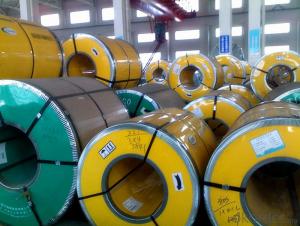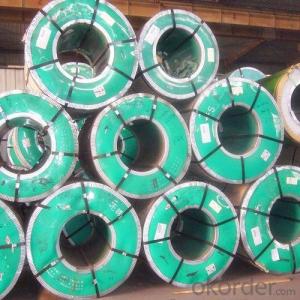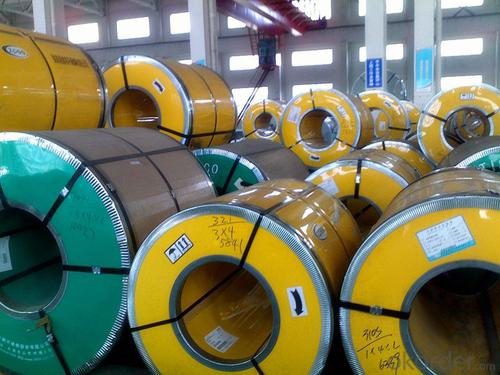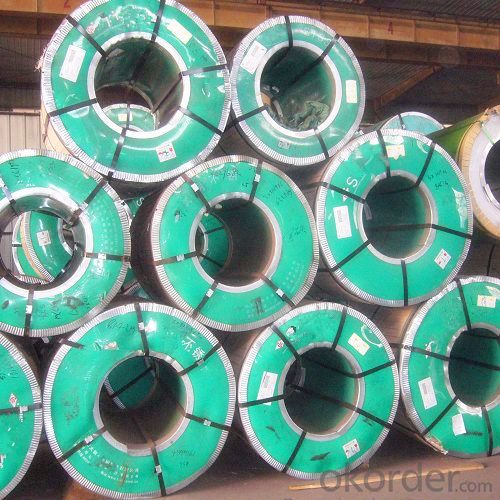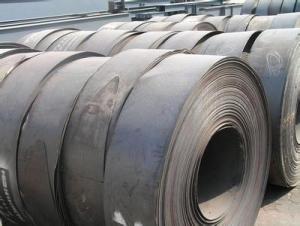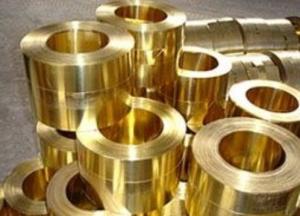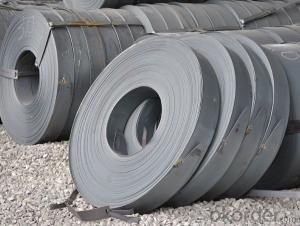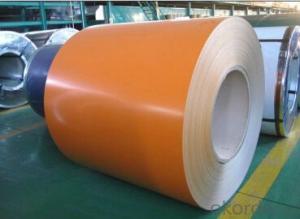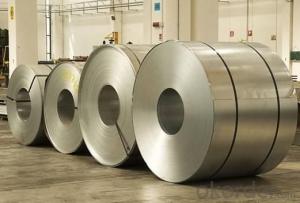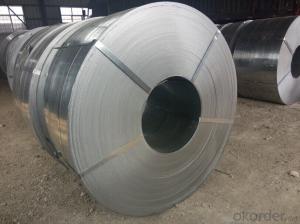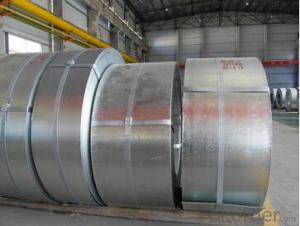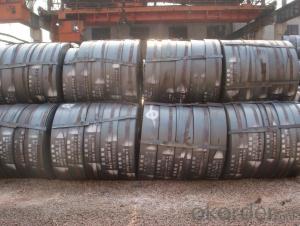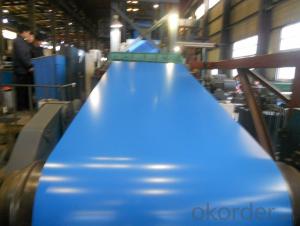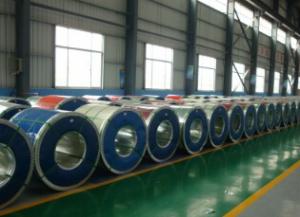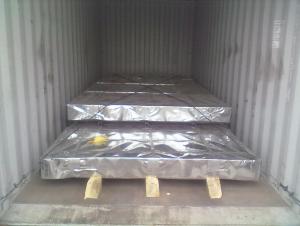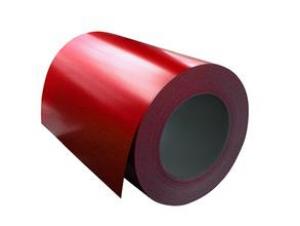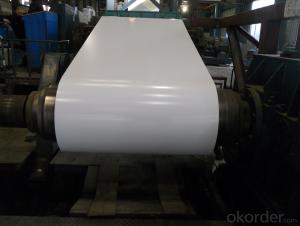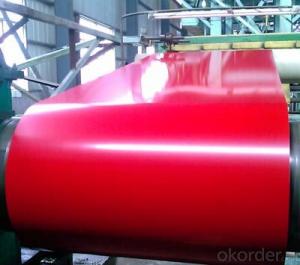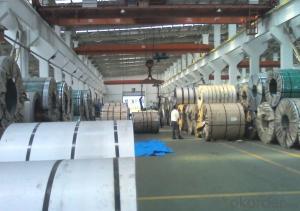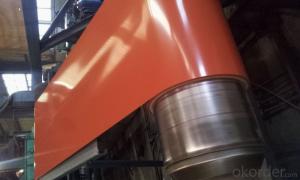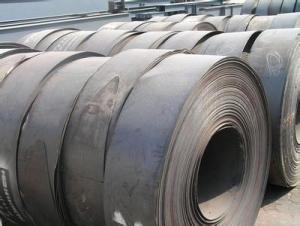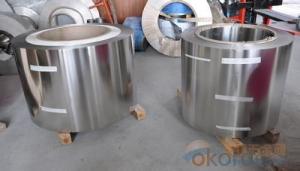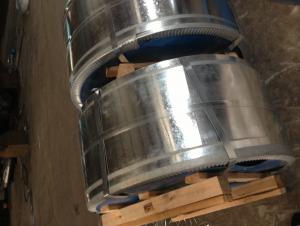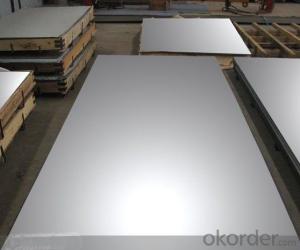Prepainted Zinc/aluzinc Steel Sheet In Coils
- Loading Port:
- Tianjin
- Payment Terms:
- TT OR LC
- Min Order Qty:
- 25 m.t.
- Supply Capability:
- 10000 m.t./month
OKorder Service Pledge
OKorder Financial Service
You Might Also Like
Prepainted Zinc/aluzinc Steel Sheet In Coils
1.Structure of Prepainted Zinc/aluzinc Steel Sheet In Coils
Structure of Prepainted Zinc/aluzinc Steel Sheet In Coils are coated with organic layer, which provides higher anti-corrosion property and a longer lifespan than that of galvanized steel sheets.
2. The base metals for Color Coated Steel Coil consist of cold rolled, HDG electro-galvanized and hot-dip alu-zinc coated steel. The finish coats of Color Coated Steel Coil can be classified into groups as follows: polyester, silicon modified polyesters, polyvinylidene fluoride, high-durability polyester, etc.
3. The production process has evolved from one-coating-and-one-baking to double-coating-and-double-baking, and even three-coating-and-three-baking.
4. The color of the Color Coated Steel Coil has a very wide selection, like orange, cream-colored, dark sky blue, sea blue, bright red, brick red, ivory white, porcelain blue, etc.
5. The Color Coated Steel Coil can also be classified into groups by their surface textures, namely regular prepainted sheets, embossed sheets and printed sheets.
2.Main Features of Prepainted Zinc/aluzinc Steel Sheet In Coils.
1) Rust-proof
2) Water-proof
3)Durable using
3. Prepainted Zinc/aluzinc Steel Sheet In Coils Images
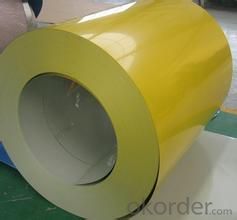
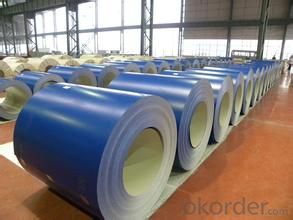
4. Prepainted Zinc/aluzinc Steel Sheet In Coils Specification
goods | Prepainted Zinc/aluzinc Steel Sheet In Coils |
Technical Standard: | JIS 3302 / ASTM A653 / EN10143/EN10327 |
Grade | DX51D / DX52D/ DX53D/ S250,280,320GD |
Width | 500/650/726/820/914/1000/1200/1219/1220/1250mm |
Thickness | 0.17-1.6mm (0.25-0.45mm is the most advantage thickness) |
Type of coating: | galvanized |
Zinc coating | Z60-120g/m2 |
Surface treatment | chromed / skin pass/ oiled /un oiled /slightly oiled/ dry |
Surface structure: | zero spangle / minimized spangle / regular spangle/ big spangle |
| MOQ | 5 Tons |
Package: | Properly packed for ocean freight exportation in 20''containers |
Price terms | FOB,CFR,CIF,CPT.CNF,CIP |
Payment terms | 30%TT in advance+70% TT or irrevocable 70%L/C at sight |
delivery time | 7days after receipt of 30% TT |
5.FAQ of Prepainted Zinc/aluzinc Steel Sheet In Coils
We have organized several common questions for our clients,may help you sincerely:
①How about your company?
A world class manufacturer & supplier of castings forging in carbon steel and alloy steel,is one of the large-scale professional investment casting production bases in China,consisting of both casting foundry forging and machining factory. Annually more than 8000 tons Precision casting and forging parts are exported to markets in Europe,America and Japan. OEM casting and forging service available according to customer’s requirements.
②How to guarantee the quality of the products?
We have established the international advanced quality management system,every link from raw material to final product we have strict quality test;We resolutely put an end to unqualified products flowing into the market. At the same time, we will provide necessary follow-up service assurance.
③What is the usage on the products?
The industrial use
The application field | example illustration |
The electrical appliance industry | Air conditioner,Computer chassis, Plate for refrigerator,Outer shell of washing machine,kitchen fittings, The freezing chamber device |
The building industry | housetop,Lateral wall,doors and windows, gutter,Shutter doors and windows,Wall frame , Ceiling joist,ventiduct |
The agricultural and pastoral | Granary,silo,animal house,trough,flume,Greenhouse trellis,Baking equipment; |
The transport | railroad:The roof of the train,The internal frame of train,The road sign,The inner walls of the train; |
The equipment and structure | radiator,cold roll-formed ,Pedals and rack |
- Q: What is the typical coefficient of thermal expansion of steel strips?
- The typical coefficient of thermal expansion of steel strips can vary depending on the specific type of steel and its composition. However, a general range for the coefficient of thermal expansion of steel is between 10 and 14 parts per million per degree Celsius (ppm/°C). This means that for every degree Celsius increase in temperature, the steel strip will expand by approximately 10-14 parts in length per million parts of its original length. It is important to note that this value can be influenced by factors such as the presence of alloying elements and the specific heat treatment applied to the steel. Therefore, it is advisable to consult the specific technical data or manufacturer's specifications to determine the precise coefficient of thermal expansion for a particular grade or alloy of steel strip.
- Q: How are steel strips used in the production of solar panels?
- Steel strips are an integral part of the production process of solar panels. These strips are primarily used for framing and providing structural support to the solar panels. They are typically made of galvanized steel, which is known for its durability and resistance to corrosion. The steel strips are cut into specific lengths and shapes to form the framework of the solar panel. This framework holds all the components of the panel together, including the glass cover, solar cells, and backsheet. The steel strips are fastened securely to ensure the stability of the panel, especially during installation and during exposure to various weather conditions. Additionally, steel strips play a crucial role in maintaining the overall integrity of the solar panel. They act as a protective barrier, shielding the delicate components of the panel from external forces such as wind, rain, and snow. By providing structural support, the steel strips help to prevent damage and ensure the longevity of the solar panel. Moreover, steel strips are essential for the installation and mounting of solar panels. They are used to secure the panels onto rooftops or other surfaces, ensuring they are firmly fixed in place. This is especially important to maximize the solar panel's exposure to sunlight and optimize its energy production. In summary, steel strips are an essential component in the production of solar panels. They provide structural support, ensure the integrity of the panel, and facilitate its installation and mounting. By incorporating steel strips into the manufacturing process, solar panels are made more robust, reliable, and efficient, contributing to the overall sustainability and effectiveness of solar energy systems.
- Q: How are steel strips protected against chemicals in industrial environments?
- Steel strips in industrial environments are typically protected against chemicals through the application of protective coatings or treatments. These coatings act as a barrier, preventing direct contact between the steel and the chemicals. Commonly used protective coatings include epoxy, polyurethane, or zinc coatings, which offer resistance to a wide range of chemicals, corrosion, and abrasion. Additionally, proper handling and storage practices are implemented to minimize exposure to chemicals and maintain the integrity of the steel strips.
- Q: What is the difference between strip steel and silicon steel?
- Silicon steel is a silicon iron alloy with silicon content of about 3%~5% and other major iron. Divided into oriented silicon steel and non oriented silicon steel, it is an important soft magnetic alloy in electric power, electronics and military industry. Silicon steel refers to a low carbon silicon iron alloy with silicon content ranging from 0.5% to 4.5%. It is divided into non oriented silicon steel and oriented silicon steel because of its different structures and uses. Silicon steel is mainly used as the core of various motors, generators, compressors, motors and transformers. It is an indispensable raw material for electric power, household appliances and other industries.
- Q: Can steel strips be used for structural purposes?
- Yes, steel strips can be used for structural purposes. They are often employed in construction and engineering applications where strength, durability, and stability are essential. Steel strips are commonly utilized in the fabrication of beams, columns, braces, and supports, providing crucial support and reinforcement to structures.
- Q: Can steel strips be used for making electrical enclosures?
- Certainly, electrical enclosures can indeed be manufactured using steel strips. The reason for steel being a popular choice for producing electrical enclosures is due to its strength and durability. By shaping and fabricating steel strips, one can create electrical enclosures of different sizes and designs to meet specific requirements. In addition, steel effectively safeguards electrical components from environmental elements like moisture, dust, and debris, making it an ideal material for enclosing them. To further enhance corrosion resistance and increase the lifespan of the electrical enclosure, the steel strips can also be treated with coatings like powder coating or galvanization. All in all, steel strips offer a dependable and sturdy option for constructing electrical enclosures.
- Q: How are steel strips processed for engraving?
- Steel strips are typically processed for engraving by first cleaning and preparing the surface to remove any dirt, oil, or rust. Then, a design or pattern is either etched or engraved onto the steel strip using specialized tools or machines. This process may involve chemical etching, laser engraving, or mechanical engraving techniques, depending on the desired outcome. After engraving, the steel strips may undergo further treatments such as polishing or coating to enhance the appearance and durability of the engraved design.
- Q: What are the different grades of steel used for making strips?
- The different grades of steel commonly used for making strips include low carbon steel, high carbon steel, stainless steel, and alloy steel.
- Q: What is the typical machinability of steel strips?
- The typical machinability of steel strips is considered to be good, as steel is a widely used material in various industries and can be easily machined using different cutting tools and techniques.
- Q: Are steel strips suitable for making jewelry?
- Yes, steel strips can be suitable for making jewelry. Steel strips are durable, versatile, and can be shaped into various designs. However, they may not be as popular as other materials like gold or silver due to their industrial aesthetic.
Send your message to us
Prepainted Zinc/aluzinc Steel Sheet In Coils
- Loading Port:
- Tianjin
- Payment Terms:
- TT OR LC
- Min Order Qty:
- 25 m.t.
- Supply Capability:
- 10000 m.t./month
OKorder Service Pledge
OKorder Financial Service
Similar products
Hot products
Hot Searches
Related keywords
